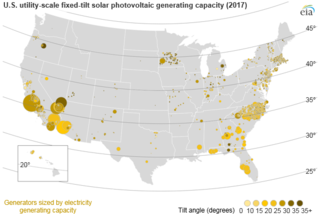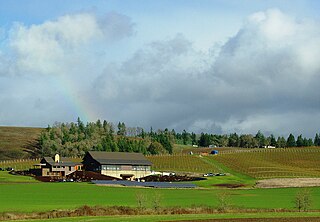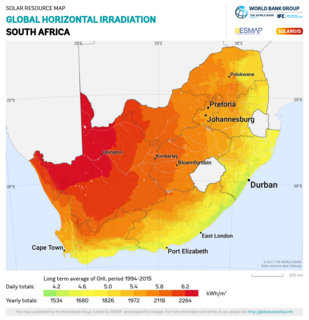
Chaminade University of Honolulu is a private Marianist university in Honolulu, Hawaii. Founded in 1955 by the Society of Mary, Chaminade is located in Kaimuki, Honolulu at the base of St. Louis Heights. Chaminade offers bachelor's degrees in 23 fields of study and five master's degree programs. The school specializes in biology, business, criminal justice, education, forensic sciences, interior design, nursing, and religious studies. Chaminade University is accredited by the Western Association of Schools and Colleges (WASC).

Solar power in the United States includes utility-scale solar power plants as well as local distributed generation, mostly from rooftop photovoltaics. As of the end of 2020, the United States had 97,275 megawatts (MW) of installed photovoltaic and concentrated solar power capacity combined. In 2018, utility scale solar power generated 66.6 terawatt-hours (TWh), 1.66% of total U.S. electricity. During the same time period total solar generation, including estimated small scale photovoltaic generation, was 96.1 TWh, 2.30% of total U.S. electricity. In terms of total cumulative installed capacity, by year end 2017 the United States ranked 2nd in the world behind China. In 2016, 39% of all new electricity generation capacity in the country came from solar, more than any other source and ahead of natural gas (29%). By 2015, solar employment had overtaken oil and gas as well as coal employment in the United States. In 2016, more than 260,000 Americans were employed in the solar industry.

Grid parity occurs when an alternative energy source can generate power at a levelized cost of electricity (LCOE) that is less than or equal to the price of power from the electricity grid. The term is most commonly used when discussing renewable energy sources, notably solar power and wind power. Grid parity depends upon whether you are calculating from the point of view of a utility or of a retail consumer.

Solar power in Japan has been expanding since the late 1990s. The country is a leading manufacturer of photovoltaics (PV) and a large installer of domestic PV systems with most of them grid connected. Japan has an insolation of about 4.3 to 4.8 kWh/(m2·day).

Solar power in California includes utility-scale solar power plants as well as local distributed generation, mostly from rooftop photovoltaics. It has been growing rapidly because of high insolation, community support, declining solar costs, and a Renewable Portfolio Standard which requires that 33% of California's electricity come from renewable resources by 2020, and 60% by 2030. Much of this is expected to come from solar power via photovoltaic facilities or concentrated solar power facilities.

Solar power in New Jersey has grown significantly, increasing from less than 50 megawatts (MW) in 2007 to over 2,800 MW in 2018, such that solar power provided 4.17% of the state's electricity consumption. This is aided by a Renewable Portfolio Standard which requires that 22.5% of New Jersey's electricity come from renewable resources by 2021, and by one of the most favorable net metering standards in the country, along with Arizona, allowing unlimited customers of any size array to use net metering, although generation may not exceed annual demand. Best practices recommend limiting net metering only to the size of the customer’s service entrance capacity. As of 2018, New Jersey has the sixth-largest installed solar capacity of all U.S. states and the largest installed solar capacity of the Northeastern States.

REC Solar was a solar energy contractor specializing in commercial solar and storage systems, including the installation of commercial solar electric systems in the United States. The company focused on providing products and services to support commercial, government and utility scale solar photovoltaic (PV) installations.

The energy sector in Hawaii has rapidly adopted solar power due to the high costs of electricity, and good solar resources, and has one of the highest per capita rates of solar power in the United States. Hawaii's imported energy costs, mostly for imported petroleum and coal, are three to four times higher than the mainland, so Hawaii has motivation to become one of the highest users of solar energy. Hawaii was the first state in the United States to reach grid parity for photovoltaics. Its tropical location provides abundant ambient energy.

Solar power in Oregon has been growing in recent years due to new technological improvements and a variety of regulatory actions and financial incentives enacted by the state government.

A community solar farm or garden is a solar power installation that accepts capital from and provides output credit and tax benefits to individual and other investors. In some systems you buy individual solar panels which are installed in the farm after your purchase. In others you purchase kW capacity or kWh of production. The farm's power output is credited to investors in proportion to their investment, with adjustments to reflect ongoing changes in capacity, technology, costs and electricity rates. Companies, cooperatives, governments or non-profits operate the farms.

Sunetric is a Hawaii-based photovoltaic solar power company that performs consultation, design, and installation of photovoltaic systems for residential, commercial, military, and non-profit customers. Sunetric operates on all of the Hawaiian islands and in several states in the continental US. The company was founded in 2004 as Suntech Hawaii by Sean Mullen. Alex Tiller is the company's CEO. The company handles system consulting, design, and installation, and remains responsible for maintenance, monitoring, and repairs.
RevoluSun is a solar company headquartered in Honolulu, Hawaii, founded in 2009. RevoluSun is a residential photovoltaic installer with offices in Hawaii, Massachusetts and Idaho. To date, RevoluSun has developed more than 8,000 photovoltaic systems generating more than 50 megawatts (MW). RevoluSun’s headquarters are located at 660 Ala Moana Blvd #220a, located in Honolulu.
Clean Power Finance, headquartered in San Francisco, California, is a financial services and software company for the residential solar industry.

Solar power in South Africa includes photovoltaics (PV) as well as concentrated solar power (CSP). In 2016, South Africa had 1,329 MW of installed solar power capacity. Installed capacity is expected to reach 8,400 MW by 2030.
Solar Liberty is an American company that installs, sells and leases solar panel energy systems, known as photovoltaic (PV) systems, for homes, businesses, schools, universities, municipalities, non-profits, and other facilities and properties.

Energy in Hawaii is a mixture of fossil fuel and renewable resources. It is complicated by the state's isolated location and lack of fossil fuel resources. The state relies heavily on imports of petroleum and coal for power. Renewable energy production is increasing. Hawaii has the highest share of petroleum use in the United States, with about 62% of electricity coming from oil in 2017. As of 2016, 26.6% of electricity was from renewable sources, including solar, wind, hydro and geothermal.
Vivint Solar, Inc. is an American solar energy company headquartered in Lehi, Utah. It is a residential solar provider that designs, installs, and maintains photovoltaic systems.

Darren T. Kimura is an American businessman, inventor, and investor. He is best known as the inventor of Micro Concentrated solar power (CSP) technology otherwise known as MicroCSP.
The U.S. state of Arkansas is a significant producer of natural gas and a minor producer of petroleum.

HelioPower, Inc. is a US-based provider of integrated energy solutions for residential, commercial, industrial, public sector and non-profit organizations. Founded in 2001, HelioPower also develops proprietary projects with third-party offtakers and currently owns and operates more than 100 energy systems at facilities like the Tech Museum of Innovation in San Jose & Ronald McDonald House in San Diego.













